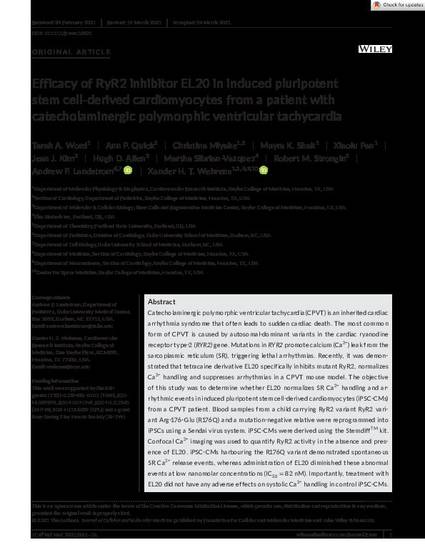
- Stem Cells -- Research,
- Cardiology
Catecholaminergic polymorphic ventricular tachycardia (CPVT) is an inherited cardiac arrhythmia syndrome that often leads to sudden cardiac death. The most common form of CPVT is caused by autosomal-dominant variants in the cardiac ryanodine receptor type-2 (RYR2) gene. Mutations in RYR2 promote calcium (Ca ) leak from the sarcoplasmic reticulum (SR), triggering lethal arrhythmias. Recently, it was demonstrated that tetracaine derivative EL20 specifically inhibits mutant RyR2, normalizes Ca handling and suppresses arrhythmias in a CPVT mouse model. The objective of this study was to determine whether EL20 normalizes SR Ca handling and arrhythmic events in induced pluripotent stem cell-derived cardiomyocytes (iPSC-CMs) from a CPVT patient. Blood samples from a child carrying RyR2 variant RyR2 variant Arg-176-Glu (R176Q) and a mutation-negative relative were reprogrammed into iPSCs using a Sendai virus system. iPSC-CMs were derived using the Stemdiff kit. Confocal Ca imaging was used to quantify RyR2 activity in the absence and presence of EL20. iPSC-CMs harbouring the R176Q variant demonstrated spontaneous SR Ca release events, whereas administration of EL20 diminished these abnormal events at low nanomolar concentrations (IC = 82 nM). Importantly, treatment with EL20 did not have any adverse effects on systolic Ca handling in control iPSC-CMs. Our results show for the first time that tetracaine derivative EL20 normalized SR Ca handling and suppresses arrhythmogenic activity in iPSC-CMs derived from a CPVT patient. Hence, this study confirms that this RyR2-inhibitor represents a promising therapeutic candidate for treatment of CPVT.
Copyright (c) 2021 The Authors
This work is licensed under a Creative Commons Attribution 4.0 International License.
